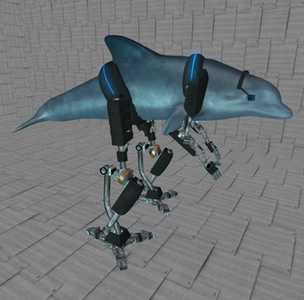anon_mepy said in #1388 2y ago:
Dolphins give each other names, and orcas (which are a kind of dolphin) communicate using different dialects/languages based on where they live on Earth. No one has yet been able to crack cetacean communication, although research is now underway to crack both dolphin and sperm whale communication using LLMs.
Many animals display the signs of pretty advanced communication, including Prairie Dogs, which can alert others to the color, size, and shape of a predator, and even if a human is holding a gun. Dolphins, however, seem to have the most advanced form of communication out of any animal other than humans (even more than chimpanzees). Studies have shown that they are able to coordinate together on opposite sides of a wall using only a microphone to inform another dolphin how to complete puzzles (over 90% success rate) (https://link.springer.com/chapter/10.1007/978-1-4899-0858-2_49).
The US, Soviet/Russian, Ukrainian, Israeli, and Iranian navy currently use dolphins to detect naval mines. Some claim that these military dolphins have been, at various periods, trained to use harpoons and other weapons in order to kill. Despite attempts to replace military dolphins with drones, trained dolphins remain more efficient than any autonomous system underwater.
A popular way to measure intelligence physically is using encephalization quotient (EQ), which is a measure of the ratio of brain mass to body size, weighted to account for the allometric effects of larger body sizes. Bottlenose dolphins (Tursiops) have the second highest EQ after humans.
All of this is interesting to me, and it was interesting to researchers in the 1970s until the dolphin craze wore off after some time. Dolphins are less intelligent than humans, but they certainly aren’t totally retarded and some interesting stuff can absolutely be done with them.
This brings me to a point that was made in the Biosingularity thread a while back (https://sofiechan.com/p/1187) regarding the power of social coordination as opposed to concentrating solely on IQ or biological intelligence. Given the ability of dolphins to organize socially and communicate abstract concepts in a manner that is second only to humans, is there, let’s say, hope for the dolphin race?
Is language and relatively low IQ (compared to humans) enough to be taught to organize in a way that is conducive to increasing intelligence and building civilization?
This also poses many questions regarding humanity’s ascent to civilization. Language was likely baked into the human brain for a very, very long time.
I also would like to add that there was an article long ago about Octopus intelligence by Bismarck Analysis’ Marko Jukic for Palladium that I enjoyed (https://www.palladiummag.com/2019/04/01/its-time-to-take-octopus-civilization-seriously/)
Now that there are s


